
Filter News
Area of Research
- Advanced Manufacturing (5)
- Biology and Environment (17)
- Building Technologies (2)
- Computational Engineering (2)
- Computer Science (12)
- Electricity and Smart Grid (1)
- Energy Science (50)
- Energy Sciences (1)
- Functional Materials for Energy (1)
- Fusion and Fission (9)
- Fusion Energy (7)
- Isotopes (1)
- Materials (31)
- Materials for Computing (8)
- Mathematics (1)
- National Security (7)
- Neutron Science (5)
- Nuclear Science and Technology (3)
- Quantum information Science (4)
- Supercomputing (28)
- Transportation Systems (1)
News Type
News Topics
- (-) Computer Science (70)
- (-) Cybersecurity (9)
- (-) Exascale Computing (11)
- (-) Fusion (19)
- (-) Microscopy (21)
- (-) Partnerships (11)
- (-) Polymers (15)
- 3-D Printing/Advanced Manufacturing (57)
- Advanced Reactors (18)
- Artificial Intelligence (33)
- Big Data (26)
- Bioenergy (26)
- Biology (31)
- Biomedical (18)
- Biotechnology (6)
- Buildings (31)
- Chemical Sciences (31)
- Clean Water (14)
- Composites (16)
- Coronavirus (15)
- Critical Materials (13)
- Emergency (2)
- Energy Storage (50)
- Environment (67)
- Fossil Energy (1)
- Frontier (10)
- Grid (28)
- High-Performance Computing (33)
- Hydropower (6)
- Irradiation (3)
- Isotopes (15)
- ITER (5)
- Machine Learning (19)
- Materials (70)
- Materials Science (54)
- Mathematics (3)
- Mercury (3)
- Molten Salt (6)
- Nanotechnology (25)
- National Security (13)
- Neutron Science (42)
- Nuclear Energy (36)
- Physics (11)
- Quantum Computing (9)
- Quantum Science (18)
- Security (4)
- Simulation (16)
- Software (1)
- Space Exploration (11)
- Statistics (1)
- Summit (11)
- Transportation (52)
Media Contacts
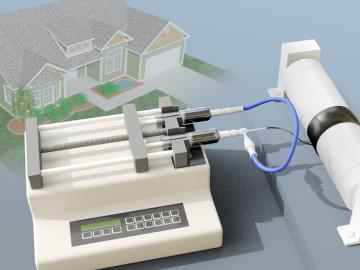
ORNL researchers have developed a novel way to encapsulate salt hydrate phase-change materials within polymer fibers through a coaxial pulling process. The discovery could lead to the widespread use of the low-carbon materials as a source of insulation for a building’s envelope.
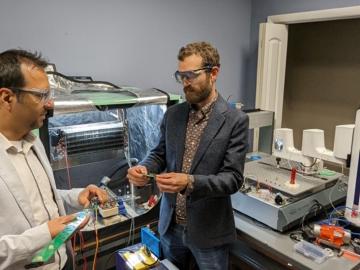
Four ORNL teams and one researcher were recognized for excellence in technology transfer and technology transfer innovation.

Researchers used the world’s first exascale supercomputer to run one of the largest simulations of an alloy ever and achieve near-quantum accuracy.

The Exascale Small Modular Reactor effort, or ExaSMR, is a software stack developed over seven years under the Department of Energy’s Exascale Computing Project to produce the highest-resolution simulations of nuclear reactor systems to date. Now, ExaSMR has been nominated for a 2023 Gordon Bell Prize by the Association for Computing Machinery and is one of six finalists for the annual award, which honors outstanding achievements in high-performance computing from a variety of scientific domains.

Michelle Kidder, a senior R&D staff scientist at ORNL, has received the American Chemical Society’s Energy and Fuels Division’s Mid-Career Award for sustained and distinguished contributions to the field of energy and fuel chemistry.

Technologies developed by researchers at ORNL have received six 2023 R&D 100 Awards.
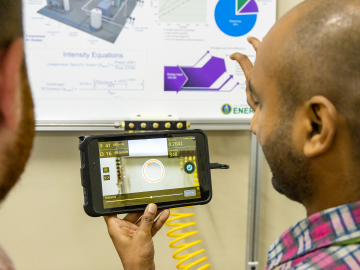
ORNL researchers have developed a training camp to help manufacturing industries reduce energy-related carbon dioxide emissions and improve cost savings.
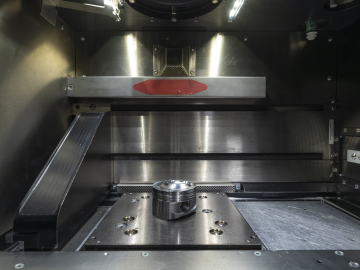
Dean Pierce of ORNL and a research team led by ORNL’s Alex Plotkowski were honored by DOE’s Vehicle Technologies Office for development of novel high-performance alloys that can withstand extreme environments.

Yarom Polsky, director of the Manufacturing Science Division, or MSD, at the Department of Energy’s Oak Ridge National Laboratory, has been elected a Fellow of the American Society of Mechanical Engineers, or ASME.
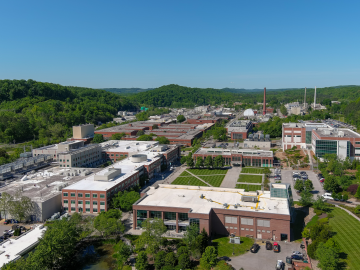
Four firms doing business with the Department of Energy’s Oak Ridge National Laboratory received ORNL Small Business Awards during an awards ceremony on June 29.


